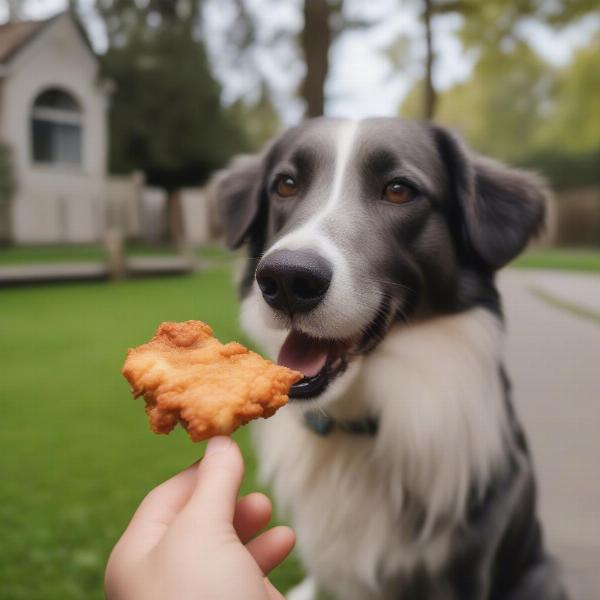Chicken tenders are a popular human food, but can dogs eat them too? The question of whether chicken tenders are safe and healthy for your canine companion is a common one. This article will delve into the nutritional value, potential risks, and best practices for feeding chicken tenders to your dog.
Can Dogs Eat Chicken Tenders?
Yes, dogs can eat chicken tenders, but with some important caveats. Plain, cooked chicken tenders can be a healthy and delicious treat for your furry friend. They are a good source of protein, which is essential for muscle development and overall health. However, it’s crucial to prepare them correctly and avoid certain ingredients that can be harmful to dogs.
chicken tender dogs are a great way to supplement your dog’s diet with extra protein.
The Nutritional Benefits of Chicken for Dogs
Chicken is packed with essential nutrients that benefit dogs, including:
- Protein: Supports muscle growth and repair.
- Amino Acids: Essential building blocks for a healthy body.
- Phosphorus: Contributes to strong bones and teeth.
- Vitamin B3 (Niacin): Supports energy metabolism.
- Vitamin B6: Helps with brain development and function.
These nutrients contribute to a healthy coat, strong immune system, and overall well-being in dogs.
Preparing Chicken Tenders for Your Dog
The key to safely feeding your dog chicken tenders is proper preparation. Never give your dog raw chicken, as it can contain harmful bacteria like Salmonella. Always cook the chicken thoroughly without any added oils, butter, or seasonings.
Avoid seasonings like onion and garlic powder, which are toxic to dogs. Keep the chicken plain and simple. You can boil, bake, or grill the chicken tenders. Once cooked, let them cool completely before giving them to your dog.
chicken tenders for dogs should always be plain and thoroughly cooked.
Potential Risks of Feeding Chicken Tenders to Dogs
While chicken tenders can be a healthy treat, there are some potential risks to be aware of:
- Choking Hazard: Cut chicken tenders into small, bite-sized pieces, especially for smaller dogs, to prevent choking.
- Pancreatitis: Feeding too much fatty chicken, especially the skin, can lead to pancreatitis, a serious inflammation of the pancreas. Always remove the skin and avoid giving your dog fried chicken.
- Food Allergies: Some dogs are allergic to chicken. Introduce chicken tenders gradually and watch for any signs of an allergic reaction, such as itching, vomiting, or diarrhea.
is canidae a good dog food is another important consideration for your dog’s overall diet and health.
How Much Chicken Can I Give My Dog?
Treats, including chicken tenders, should make up no more than 10% of your dog’s daily caloric intake. Start with a small amount and monitor your dog for any adverse reactions.
 Chó ăn thịt gà
Chó ăn thịt gà
Can Puppies Eat Chicken Tenders?
Yes, puppies can eat chicken tenders, but follow the same guidelines as for adult dogs. Make sure the chicken is cooked thoroughly, cut into small pieces, and given in moderation.
Dr. Emily Carter, a veterinarian specializing in canine nutrition, advises, “Introducing new foods to puppies should be done gradually. Start with a very small amount of cooked chicken and observe your puppy for any digestive upset.”
Conclusion
Chicken tenders can be a healthy and enjoyable treat for your dog when prepared and served correctly. Always cook the chicken thoroughly, avoid seasonings and skin, and offer it in moderation. Remember to consult with your veterinarian if you have any concerns about adding chicken tenders to your dog’s diet.
venison recipes for dogs offer another healthy and protein-rich alternative to chicken.
FAQ
- Can I give my dog raw chicken tenders? No, raw chicken can contain harmful bacteria and should never be given to dogs.
- What seasonings are safe for dogs? Avoid all seasonings, especially onion and garlic powder, which are toxic to dogs.
- Can I give my dog fried chicken tenders? No, fried chicken is too high in fat and can cause pancreatitis in dogs.
- How should I cook chicken for my dog? Boiling, baking, or grilling are the best methods for cooking chicken for dogs.
- What if my dog is allergic to chicken? If your dog shows signs of an allergy, such as itching or vomiting, stop feeding them chicken and consult your veterinarian.
- Can I give my dog chicken tenders every day? Chicken tenders should be given as an occasional treat and not as a regular part of your dog’s diet.
- How do I know if my dog is choking on a chicken tender? Signs of choking include gagging, pawing at the mouth, and difficulty breathing.
ILM Dog is your trusted resource for all things dog-related. We offer expert advice on dog breeds, health, training, nutrition, grooming, and much more. Whether you’re a new dog owner or a seasoned pro, we provide practical and reliable information to help you care for your canine companion. For expert guidance on dog nutrition and personalized advice, reach out to us at [email protected] or call us at +44 20-3965-8624. ILM Dog is dedicated to helping you provide the best possible care for your beloved furry friend.